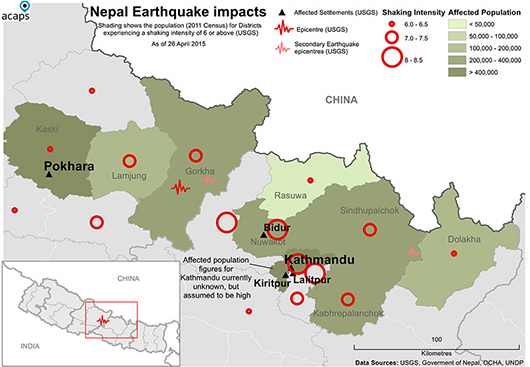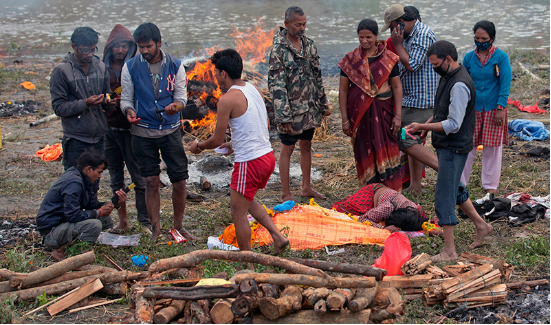
World Food Programme (WFP) is one of several United Nations (UN) agencies that have contacted NRC’s NORCAP roster with requests for experts to the humanitarian response in Nepal. These agencies have indicated a particular need for expertise support in shelter, logistics, engineering, information management, gender mainstreaming and IT.
“We are now working to identify and contact NORCAP experts within these fields in order to deploy them to Nepal”, says NORCAP’s Benedicte Giæver.

Graphic: ACAPS (www.acaps.org)
Chaotic and unclear
According to the latest figures today over 3,800 people are dead and at least 6,000 injured. There are still no estimates of the numbers of missing persons after Saturday’s quake. The situation is still very unclear and the numbers of dead and injured are constantly increasing. 35 of Nepal’s 75 districts are affected, and there are still hundreds of villages and areas near the epicentre of the earthquake that remain cut off or hard to access.
“Our people in Kathmandu describe a chaotic and unclear situation. The worst is the situation of all the people that we cannot reach, those who live in villages that are still completely isolated. On top of this, people fear that there will be several more large aftershocks”, says Giæver.
At NRC / NORCAP headquarters in Oslo, staff are now working intensively to deploy experts requested by UN organizations, in order to deploy then to Nepal as quickly as possible. NORCAP has broad experience with this work from several previous, acute large-scale humanitarian crises, such as the earthquake in Haiti in 2010 and typhoon Hayian in the Philippines in 2013.

A woman cries over the body of her husband as its prepared to be cremated along a river in Kathmandu, Nepal, April 27, 2015. Photo: REUTERS/Danish Siddiqui. www.trust.org
Ready to support
“We are ready to support the UN and the Nepalese authorities where it is needed. In the first phase we will send in experts to strengthen the coordination of the relief work and to ensure that needs assessment and situation analysis get done quickly. This is very important to ensure that the right decisions are made to enable an efficient and adequate emergency response”, says Giæver.
Support to grassroots organizations
Giæver says that several major challenges lie ahead: “To get an overview of how many people are affected. Coordination of response activities. Access to remote villages that are affected. Coordination between the government and the international community, and last but not least, coordination so that we can support the work of the Nepalese grassroots”, summarizes Giæver.
“At present, it is most urgent to save as many lives as possible. At the same time we must protect those who are hardest hit and need immediate help. They must get shelter, food and clean water, and clean water and sanitation solutions. The overall focus areas in this phase are coordination and logistics”.

